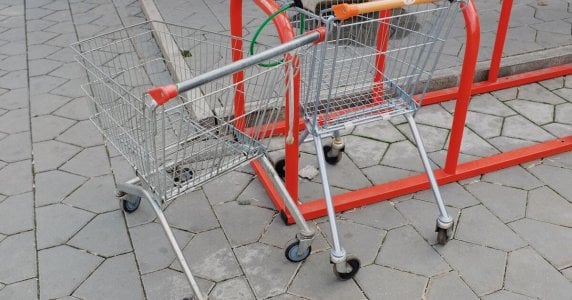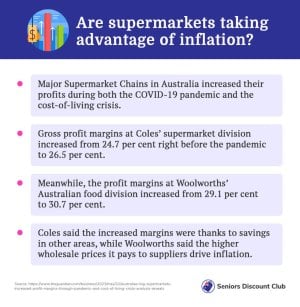Shocking findings: Australia's biggest supermarkets profited from the pandemic and cost-of-living crisis
- Replies 15
If your household budget is feeling stretched by the increase in grocery prices, then you’re not alone. But amid all the chaos and steady price hikes, reports have shown that big businesses are still booming.
An analysis of Coles and Woolworths’ financial accounts revealed that over a five-year period, the two supermarket giants increased their margins on their food businesses throughout the pandemic, raising allegations of inflationary profiteering.
This highly lucrative period contrasts with the slowing performance and subdued outlook for the supermarket giants shortly before the outbreak of COVID-19.
So why are the supermarkets able to increase their profit margins from the pandemic?
According to Coles, the increased margins have come from cost savings in other areas. Whereas Woolworths said their higher wholesale prices were enough to cover supply costs.
However, the increase in the sales of the supermarket industry revealed that shoppers were being charged more than enough to cover additional expenses stores pay to suppliers and to account for other costs, such as energy bills.
George Boubouras, the Executive Director and Head of Research at K2 Asset Management, said there was a ‘strong argument’ that supermarkets were approaching an ‘oligopolistic pricing power’, which is when only a few companies can exert control over the market and provide uncompetitive prices.
‘To address high inflation, we need to get prices to start falling again,’ he stated.
An analysis revealed that gross margins at Coles’ supermarket division increased from 24.7 per cent right before the pandemic to 26.5 per cent. Meanwhile, the profit margins at Woolworths’ Australian food division increased from 29.1 per cent to 30.7 per cent.
According to Mr Boubouras, it’s crucial to monitor prices to ensure they drop accordingly. This is especially important for flood-affected items, such as fruit and vegetables, to ensure that after supplies return, the prices will return to their lower price points.
But what’s behind these rising prices?
In 2019, it was revealed that sales growth was decreasing at Coles, and analysts were also preparing to see lower margins at Woolworths.
But the panic buying in 2020 after the first wave of the pandemic led to a surge in sales for both supermarkets, who were also able to increase their prices in a trend that continued – and even accelerated – as inflation started to soar.
In Australia, Coles and Woolworths are the top earners in the supermarket sector, with a combined control over two-thirds of the market. On the other hand, ALDI (which doesn’t disclose its profit margins because it’s not a listed company, has an 11 per cent share.
However, both supermarkets were quick to defend themselves.
A spokesperson for Coles said the retail giant has a four-year program that’s designed to save costs. This includes fast checkouts, stock ordering options, and some distribution centre changes to improve processes.
‘Gross margin expansion has largely been driven by our smarter selling program, strategic sourcing initiatives and reduced COVID-related costs,’ the spokesperson shared.
Meanwhile, a spokesperson for Woolworths clarified that many factors other than costs paid for by customers have an effect on their margins. This included the way the supermarket managed its stock loss or the items it couldn’t sell.
‘The higher wholesale prices we’re paying to suppliers is the primary driver of inflation,’ the spokesperson said.
The store also previously hinted that its financial results were because of its price increases, which they have stated was ‘in line’ with the price hikes from its suppliers.
Moreover, representatives from supermarkets who addressed a Senate committee recently said they were shielding customers from some of the fees charged by their suppliers.
The representatives also stated that the war in Ukraine affected canned goods, fertilisers, and other items, as well as supply disruptions borne out of pandemic-related restrictions had a lasting impact on food prices.
Now, there’s a push to investigate irregularities.
But several market competition regulators and experts said that any probes would have to be initiated by the federal government.
The Greens proposed that the ACCC be given additional powers, such as divestment rights, to keep a check on monopolistic behaviour and unreasonable price-gouging.
‘It’s no surprise to have it revealed that the supermarkets have increased their profits in recent times, and like so many other corporations, there is definitely profiteering going on,’ Senator Nick McKim and the Greens’ competition policy spokesperson said.
Food is the second-biggest cost of the average household (after housing), making up 17 per cent of the total cost of living, according to the Australian Bureau of Statistics.
But while prices in the United Nations food price index are still lower than a year ago, that relief has yet to be reflected in our local supermarkets. The prices of food in Australia have dropped slightly from the floods last year, but prices are still rising by 8 per cent compared to 12 months ago.
Many economists, including UBS's London-based Paul Donovan, believe that companies taking advantage of the pandemic to inflate margins and keep prices inflated are a major contributor to inflation.
However, the Reserve Bank has dismissed any ideas that profiteering is playing a role in driving up prices, which has attracted criticism.
Australia Institute's Greg Jericho has blamed the country's 'complete lack of competition in the retail sector' for the increased profits of supermarkets, pointing out how wages have not risen almost as fast as inflation.
‘When you see both Woolies and Coles increasing their profit margins, it really speaks to the complete lack of competition in Australia’s retail sector,’ Mr Jericho said.
‘So, one cost that hasn’t increased is the cost of labour, and that’s also helping with their margins,’ he continued.

Have you ever felt taken advantage of by supermarket prices? What do you think should be done to protect shoppers? Let us know your thoughts in the comments below.
An analysis of Coles and Woolworths’ financial accounts revealed that over a five-year period, the two supermarket giants increased their margins on their food businesses throughout the pandemic, raising allegations of inflationary profiteering.
This highly lucrative period contrasts with the slowing performance and subdued outlook for the supermarket giants shortly before the outbreak of COVID-19.
So why are the supermarkets able to increase their profit margins from the pandemic?
According to Coles, the increased margins have come from cost savings in other areas. Whereas Woolworths said their higher wholesale prices were enough to cover supply costs.
However, the increase in the sales of the supermarket industry revealed that shoppers were being charged more than enough to cover additional expenses stores pay to suppliers and to account for other costs, such as energy bills.
George Boubouras, the Executive Director and Head of Research at K2 Asset Management, said there was a ‘strong argument’ that supermarkets were approaching an ‘oligopolistic pricing power’, which is when only a few companies can exert control over the market and provide uncompetitive prices.
‘To address high inflation, we need to get prices to start falling again,’ he stated.
An analysis revealed that gross margins at Coles’ supermarket division increased from 24.7 per cent right before the pandemic to 26.5 per cent. Meanwhile, the profit margins at Woolworths’ Australian food division increased from 29.1 per cent to 30.7 per cent.
According to Mr Boubouras, it’s crucial to monitor prices to ensure they drop accordingly. This is especially important for flood-affected items, such as fruit and vegetables, to ensure that after supplies return, the prices will return to their lower price points.
But what’s behind these rising prices?
In 2019, it was revealed that sales growth was decreasing at Coles, and analysts were also preparing to see lower margins at Woolworths.
But the panic buying in 2020 after the first wave of the pandemic led to a surge in sales for both supermarkets, who were also able to increase their prices in a trend that continued – and even accelerated – as inflation started to soar.
In Australia, Coles and Woolworths are the top earners in the supermarket sector, with a combined control over two-thirds of the market. On the other hand, ALDI (which doesn’t disclose its profit margins because it’s not a listed company, has an 11 per cent share.
However, both supermarkets were quick to defend themselves.
A spokesperson for Coles said the retail giant has a four-year program that’s designed to save costs. This includes fast checkouts, stock ordering options, and some distribution centre changes to improve processes.
‘Gross margin expansion has largely been driven by our smarter selling program, strategic sourcing initiatives and reduced COVID-related costs,’ the spokesperson shared.
Meanwhile, a spokesperson for Woolworths clarified that many factors other than costs paid for by customers have an effect on their margins. This included the way the supermarket managed its stock loss or the items it couldn’t sell.
‘The higher wholesale prices we’re paying to suppliers is the primary driver of inflation,’ the spokesperson said.
The store also previously hinted that its financial results were because of its price increases, which they have stated was ‘in line’ with the price hikes from its suppliers.
Moreover, representatives from supermarkets who addressed a Senate committee recently said they were shielding customers from some of the fees charged by their suppliers.
The representatives also stated that the war in Ukraine affected canned goods, fertilisers, and other items, as well as supply disruptions borne out of pandemic-related restrictions had a lasting impact on food prices.
Now, there’s a push to investigate irregularities.
But several market competition regulators and experts said that any probes would have to be initiated by the federal government.
The Greens proposed that the ACCC be given additional powers, such as divestment rights, to keep a check on monopolistic behaviour and unreasonable price-gouging.
‘It’s no surprise to have it revealed that the supermarkets have increased their profits in recent times, and like so many other corporations, there is definitely profiteering going on,’ Senator Nick McKim and the Greens’ competition policy spokesperson said.
Food is the second-biggest cost of the average household (after housing), making up 17 per cent of the total cost of living, according to the Australian Bureau of Statistics.
But while prices in the United Nations food price index are still lower than a year ago, that relief has yet to be reflected in our local supermarkets. The prices of food in Australia have dropped slightly from the floods last year, but prices are still rising by 8 per cent compared to 12 months ago.
Many economists, including UBS's London-based Paul Donovan, believe that companies taking advantage of the pandemic to inflate margins and keep prices inflated are a major contributor to inflation.
However, the Reserve Bank has dismissed any ideas that profiteering is playing a role in driving up prices, which has attracted criticism.
Australia Institute's Greg Jericho has blamed the country's 'complete lack of competition in the retail sector' for the increased profits of supermarkets, pointing out how wages have not risen almost as fast as inflation.
‘When you see both Woolies and Coles increasing their profit margins, it really speaks to the complete lack of competition in Australia’s retail sector,’ Mr Jericho said.
‘So, one cost that hasn’t increased is the cost of labour, and that’s also helping with their margins,’ he continued.
Key Takeaways
- Australia's big supermarket chains, Coles and Woolworths, increased their profit margins throughout the pandemic and cost-of-living crisis.
- Critics argue that this pricing decision is evidence of inflationary profiteering and lack of competition within the retail sector.
- George Boubouras, Executive Director at K2 Asset Management, suggests that an inquiry with the power to improve transparency should be established.
- Coles and Woolworths attribute the increased margins to smarter selling programs, reduced COVID-related costs, and inflation driven by higher wholesale prices paid to suppliers.











